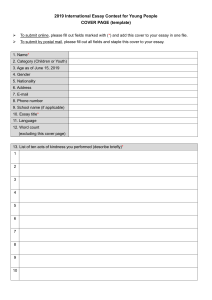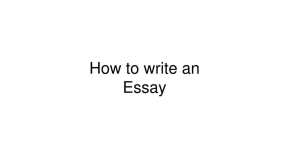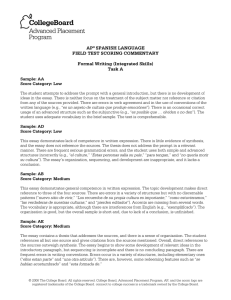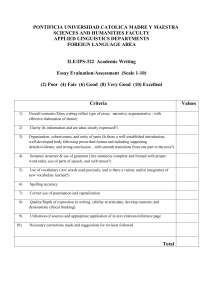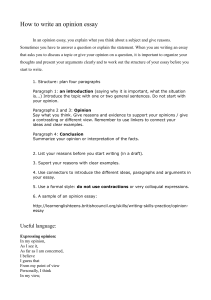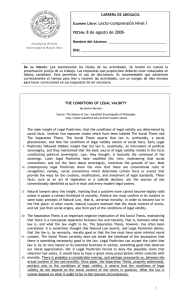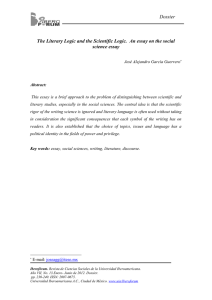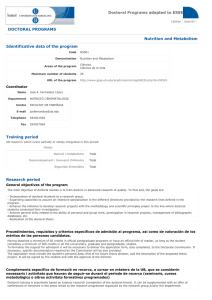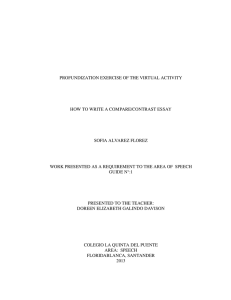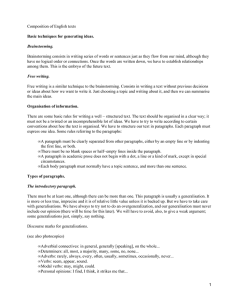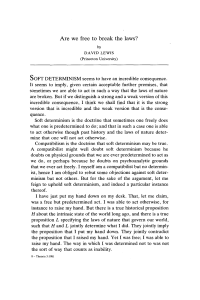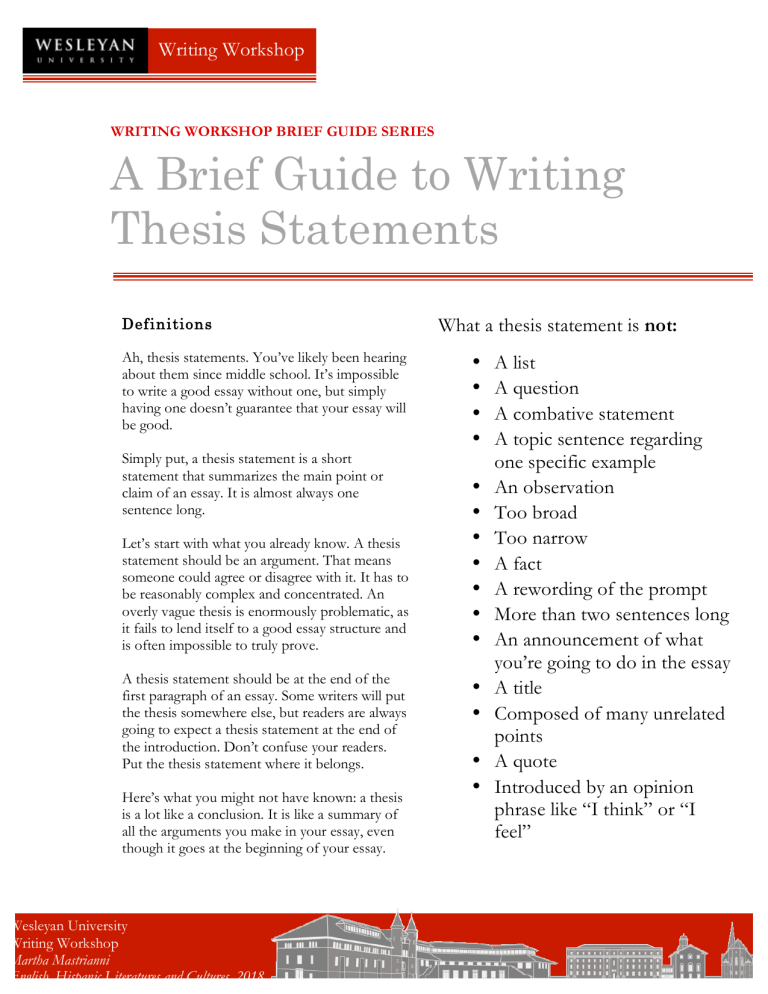
Writing Workshop WRITING WORKSHOP BRIEF GUIDE SERIES A Brief Guide to Writing Thesis Statements Definitions Ah, thesis statements. You’ve likely been hearing about them since middle school. It’s impossible to write a good essay without one, but simply having one doesn’t guarantee that your essay will be good. Simply put, a thesis statement is a short statement that summarizes the main point or claim of an essay. It is almost always one sentence long. Let’s start with what you already know. A thesis statement should be an argument. That means someone could agree or disagree with it. It has to be reasonably complex and concentrated. An overly vague thesis is enormously problematic, as it fails to lend itself to a good essay structure and is often impossible to truly prove. A thesis statement should be at the end of the first paragraph of an essay. Some writers will put the thesis somewhere else, but readers are always going to expect a thesis statement at the end of the introduction. Don’t confuse your readers. Put the thesis statement where it belongs. Here’s what you might not have known: a thesis is a lot like a conclusion. It is like a summary of all the arguments you make in your essay, even though it goes at the beginning of your essay. Wesleyan University Writing Workshop Martha Mastrianni English, Hispanic Literatures and Cultures, 2018 What a thesis statement is not: • • • • • • • • • • • • • • • A list A question A combative statement A topic sentence regarding one specific example An observation Too broad Too narrow A fact A rewording of the prompt More than two sentences long An announcement of what you’re going to do in the essay A title Composed of many unrelated points A quote Introduced by an opinion phrase like “I think” or “I feel” 2 Getting Started When in doubt, talk out your You need to know what your essay will be about, even if it ends up changing along the way. Here are some ideas to get you going on your thesis. • Ask a friend’s advice. • If you’re really struggling to find a topic, go back to the reading (or research or notes) and find the part that interested you the most. It interested you for a reason. • Speaking of interesting things, make it a habit of underlining/highlighting parts of your reading or notes that are particularly interesting to you, or that you think could lend themselves to a good essay. • Write a letter to your readers. Explain your topic, and tell them why they should care. • Make a list. Write out everything related to your topic that you can think of. main ideas with someone, like a professor or even a friend. A conversation can help you clarify your essay’s thesis. Topic Sentences Topic sentences of body paragraphs are like mini thesis statements. They’re argumentative, and someone could disagree with them. They set out to prove the thesis on a smaller scale, in a particular instance or with a particular fact. They should often have some aspect of the thesis in them; this is where buzzwords/phrases come in. They’re a great way to work your argument into each paragraph, but they’re not the only way. If you have a multi-part thesis, try to work the first part of the thesis into the early body paragraphs, the second part into later paragraphs, and so on. How Outlines Can Help Don’t think of an outline as an optional part of the writing process. Although it can seem daunting, essay planning is necessary for good writing and good thesis statements. • A n o u t lin e is h e lpfu l if it fu n ct io ns li ke an u n off icia l d raft . • Instead of w riting the essay al l in o ne g o and h av in g to to t all y ch an ge yo u r th e sis by t h e e n d (be ca us e we kno w t h at n e w ide as co me w h e n yo u ’re wr iting stuff down), yo u can m ake all t h ese ch an g es be fo re y ou offici ally s tar t t he ess ay itself. • Yo ur t he sis at the end of m aking an out lin e is go in g to be a b etter re fle ct io n o f wh at y o u wa nt to say than y our thesi s w hen you j ust sta rt. • Yo u m ig ht sti ll ha ve to re vi se t he th e sis aft e r y o u wr ite a draft, b ut you’ll li kel y be add in g n ua nc e inste ad of chan g in g yo ur ide as o utri ght. Th is leav es yo u mo re t im e t o e dit for co n te n t a nd st yle ! • Th ere’s no sin gl e form ul a fo r ou t lin e st ru ct u re . Yo u can t ype o r h an dwr it e an o utli n e, a nd i t can ha ve m an y diffe re n t fo rm ats. E xp eri me n t t o fin d wh a t works best for you. • Incl ude your evidence i n the outli ne. D on’t wa it u n ti l t h e fi rst dra ft t o fig u re o u t wh a t qu o te s to cit e i n yo u r pape r. T h ese qu o t es are of te n w h at yo u ’re an aly zin g, a nd t h ey can h el p p oi nt yo u t o war d a go o d th e sis sta te m en t . Buzzw ords and Buzz-phrases I cannot overstate the importance of having some sort of buzzword or “buzz-phrase” in a thesis statement. These are just a few words that encapsulate a major part of your argument. For example, in an essay about Sor Juana Ines de la Cruz, a Latin American Nun who fought for the education of women, a buzz-phrase might be “the gendered segregation of knowledge.” THIS IS NOT AN ENTIRE THESIS STATEMENT. The entire thesis statement for this essay was, “In her letter, Sor Juana refutes the idea that all men are or can be wise. She uses this point to emphasize the sexism and the gendered segregation of knowledge in her society and in the logic of ‘Sor Filotea,’ subtly exposing the real identity of ‘Sor Filotea.’” This is not a perfect thesis statement, and it sounded better when I wrote it in Spanish. However, it is a good example of a thesis statement that contains a buzzphrase. Buzz-phrases are helpful because they catch the reader’s attention, and they often make great titles for essays. However, their true power comes from being woven into the rest of an essay. Working these buzz-phrases from your thesis into paragraphs can strengthen the individual argument. Buzz-phrases can help a writer stay on track. A famous example of a buzz-phrase is “gender performativity.” This phrase was coined by Judith Butler in her 1990 book Gender Trouble, and is now used by many scholars. She repeats this phrase or variations of it throughout the book. ONLINE RESOURCES 3 • Weak Thesis Example: “People should exercise moderation.” • Improved Thesis Example: “Buddhism’s Middle Way of moderation helps its adherents have peaceful interpersonal relationships.” • The Reasoning: The second one is not a perfect thesis statement, but it would work as a preliminary thesis, giving the writer a direction in which to go. You’re striving for nuance; don’t be afraid to have a long sentence with multiple clauses as your thesis. Counterarguments: Often, you can put a counterargument right in your thesis. You’ll also have to address this counterargument later. You can put a counterargument in your thesis by saying something like “Although m shows that n, x shows that y is z.” Acknowledging the counterargument shows thought and preparation. Not every thesis statement needs a counterargument, but it doesn’t hurt. • Q: What if my essay prompt doesn’t need a thesis statement? • A: If there’s no thesis, you’re writing a report or a paper, not an essay. If you’re supposed to do any of your own analysis, you’ll need a thesis, or at least a topic sentence. If your essay has a summary component and an analytical/argumentative component, have your intro with your thesis first, the summary component as the next few paragraphs, and the analytical component after that. • When in doubt about a prompt, you can always ask your professor for clarification. Here are some more resources about thesis statements. • https://www.bowdoin.edu/writing-guides/thesis.htm, overview • https://owl.english.purdue.edu/owl/resource/588/01/, overview • http://writing.colostate.edu/guides/page.cfm?pageid=436&guideid=21, getting started • http://writingcenter.fas.harvard.edu/pages/how-read-assignment, reading a prompt • https://www4.csudh.edu/Assets/CSUDH-Sites/TLC/docs/thesis-statementsworksheet.pdf, prewriting exercises • http://writing2.richmond.edu/writing/wweb/thesis2.html, revising a thesis •
